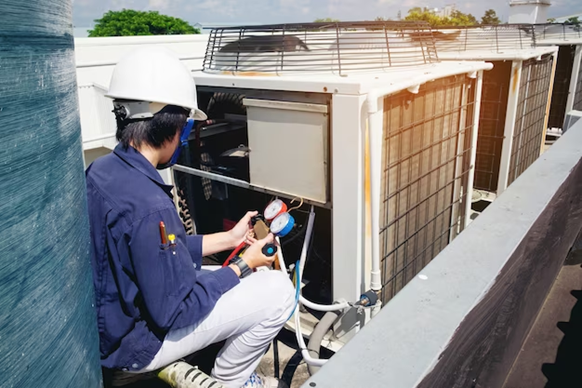Heating Ventilation and Air Condition HVAC
This program is designed to provide students with the knowledge and skills required to become HVAC technicians. Our program offers two options, General technician and the Advance Diploma in HVAC, students will also receive training in soft skills such as communication, customer service, and teamwork.
PHILLY-TECH’s program provides experiences in maintenance and the installation. Students will learn about the four categories: split systems, hybrid systems, duct-free systems, and packaged heating and air systems.
Our curriculum is regularly updated to keep up with evolving HVAC technology and industry standards. Graduates of this program will be well-prepared for careers as HVAC technicians in residential, commercial, and industrial settings.

Diploma in Agriculture Commodities Management
Duration: 1 to 2 years (4 to 8 Trimesters).
HVAC 100: Introduction to HVAC Systems
- Overview of HVAC systems and their applications
- Role and responsibilities of an HVAC technician
- Historical development of HVAC technology
HVACS 100: Occupational Safety
- Workplace safety regulations and practices in HVAC
- Personal protective equipment (PPE)
- Recognizing and avoiding HVAC hazards
THERMO 100: Thermodynamics and Heat Transfer
- Basics of thermodynamics
- Heat transfer mechanisms
- Temperature and pressure measurement
REFCYC 100: Basic Refrigeration Cycle
- Components of a refrigeration system
- Refrigerants and their properties
- Operating principles of a basic refrigeration cycle
HVACSD 100: HVAC System Design
- HVAC system components and configurations
- Load calculation and system sizing
- Ductwork design and layout
HVAC Installation and Startup
- Installation of HVAC systems
- Refrigerant handling and charging
- System startup and commissioning
HVACM 100: Maintenance and Troubleshooting
- Routine maintenance procedures
- Troubleshooting common HVAC issues
- Use of HVAC diagnostic tools and equipment
HVAVWIR 100: Electrical Components and Wiring
- Identification and testing of electrical components
- Electrical circuits and controls
- Electrical safety in HVAC work
HVACS 100: Heating Systems
- Overview of heating systems (furnaces, boilers, heat pumps)
- Heating system installation and maintenance
- Combustion analysis and safety procedures
IAIRQV 100: ventilation and Indoor Air Quality
- Ventilation system design and installation
- Air filtration and purification
- Managing indoor air quality
ACSYST 100: Air Conditioning Systems
- Air conditioning system types (split systems, packaged units, central systems)
- Installation and maintenance of air conditioning units
- Refrigerant handling and environmental regulations
HVACE 100: Energy Efficiency and Green HVAC
- Energy-efficient HVAC practices
- Sustainable HVAC systems and technology
- Government incentives for energy-efficient HVAC installations
HVACCO 100: HVAC Controls and Automation
- HVAC control systems
- Automation and smart controls
- Programming and integration
HVACIC 100: Commercial and Industrial HVAC
- Commercial and industrial HVAC systems
- Large-scale system installation and maintenance
- Specialty systems (chillers, boilers, cooling towers)
SRCOMP 100: Safety and Regulatory Compliance
- Safety management in HVAC
- Compliance with industry standards and codes
- Environmental regulations and refrigerant handling
AVACTES 100: Practical Training and Final Assessment
- Hands-on experience in HVAC installation, maintenance, and troubleshooting
- Final assessment and evaluation of practical skills
Successful completion of the program leads to the award of the Diploma in HVAC Technician
Students have to contact the school administration if they want to take extra credits or transfer credits to pursue the Diploma Certificate or Associate of Applied Science (A.A.S.) Degree in their field of interest. Students will select required number courses in each of the areas listed to meet general education requirements graduation for the A.A.S. Some of these courses can be transferred directly from and to the university system and may be substituted for recommended courses on the outline. Students should speak with an advisor before doing so these selective courses are required for all students.
- Selected Communication Course (Choose two for Diploma or three for the Associate)
ENGL 100: Fundamentals of Speech
CPL 100: Career Planning
CPL 101: Communications and Career Strategies
ENGL 101: Composition
ENGL 102: composition
- Selected Mathematics Course (Choose two for Diploma or three for the Associate)
MATH 100:General Math
MATH 101:Intermediate Algebra
MATH 102:College Algebra
- Selected Social Science Course (Choose two for Diploma or four for the Associate)
ECON 105:Leadership
ECON 101:Principles of Microeconomics I
ECON 102:Principles of Macroeconomics II
SOC 101:Introduction to Sociology
PSYC 101: Introduction to Psychology
HIST 101: History
